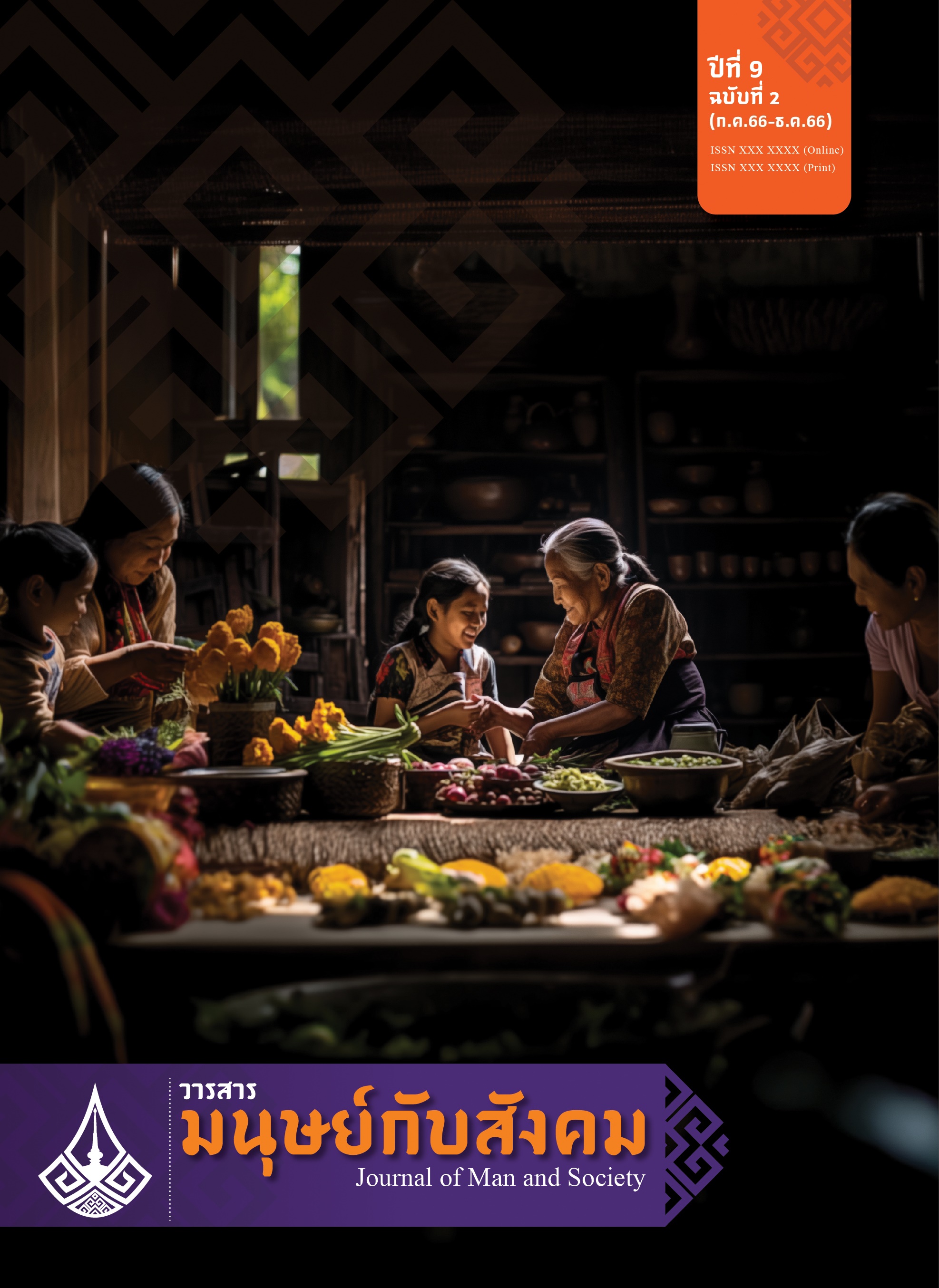การพัฒนาวิชาชีพครูสอนภาษาจีนระดับนานาชาติ ตามแนวคิดด้านการศึกษาของขงจื่อ
Main Article Content
บทคัดย่อ
ปรัชญาของขงจื่อมีผลกระทบอย่างลึกซึ้งต่อการพัฒนาสังคมของจีนตั้งแต่สมัยโบราณจนถึงปัจจุบัน ซึ่งรวมถึงแนวคิดด้านคุณธรรมจริยธรรม ด้านการเมืองการปกครอง ด้านเศรษฐกิจ ด้านวัฒนธรรม และด้านการศึกษา ด้วยการพัฒนาอย่างรวดเร็วของเศรษฐกิจจีน ทำให้ภาษาจีนได้รับความนิยมจากผู้คนทั่วโลก และการศึกษาภาษาจีนระดับนานาชาติก็ได้รับการพัฒนาอย่างต่อเนื่อง ขงจื่อได้รับการยกย่องให้เป็นครูที่ศักดิ์สิทธิ์ที่สุดและต้นแบบครูทุกยุคทุกสมัย แนวคิดด้านการศึกษาของขงจื่อมีคุณค่าและความสำคัญที่ไม่สามารถละเลยได้ในการพัฒนาการศึกษาภาษาจีนระดับนานาชาติ บทความวิชาการนี้มีวัตถุประสงค์เพื่อวิเคราะห์แนวคิดด้านการศึกษาของขงจื่อ อภิปรายความเชื่อมโยงระหว่างคำสอนที่เกี่ยวข้องกับแนวคิดด้านการศึกษาของขงจื่อในคัมภีร์หลุนอี่ว์กับแนวคิดการพัฒนาวิชาชีพครูสอนภาษาจีนระดับนานาชาติ และเสนอความคิดเห็นสำหรับการพัฒนาวิชาชีพครูสอนภาษาจีนระดับนานาชาติจากมุมมองของแนวคิดด้านการศึกษาของขงจื่อผลการศึกษาพบว่า หลัก “การศึกษาไม่แบ่งชนชั้น” และหลัก “ปรับการสอนตามลักษณะวิสัยของผู้เรียน” เป็นหลักการสำคัญในแนวคิดด้านการศึกษาของขงจื่อ ซึ่งผู้สอนภาษาจีนระดับนานาชาติควรปลูกฝังความคิดเติบโต (Growth Mindset) สำหรับตนเองและผู้เรียนมีการสะท้อนคิดหลังการสอน (Reflection) และให้ความสำคัญกับการคิดในการจัดการเรียนการสอน และสถานศึกษาหรือหน่วยงานการศึกษาควรสร้างชุมชนแห่งการเรียนรู้ (Professional Learning Communi ty: PLC) สำหรับครูชาวไทยและครูชาวจีน เพื่อพัฒนาคุณภาพการเรียนการสอนภาษาจีนอย่างมีประสิทธิภาพมากขึ้น
Article Details

อนุญาตภายใต้เงื่อนไข Creative Commons Attribution-NonCommercial-NoDerivatives 4.0 International License.
เนื้อหาและข้อมูลที่ตีพิมพ์ลงในวารสารมนุษย์กับสังคม ถือเป็นข้อคิดเห็นและความรับผิดชอบโดยตรงของผู้เขียนซึ่งกองบรรณาธิการวารสารไม่จำเป็นต้องเห็นด้วยหรือร่วมรับผิดชอบใดๆ
บทความ ข้อมูล เนื้อหา รูปภาพ ฯลฯ ที่ได้รับการตีพิมพ์ในวารสารมนุษย์กับสังคม ถือเป็นลิขสิทธิ์ของวารสาร หากบุคคลหรือหน่วยงานใดต้องการนำทั้งหมดหรือส่วนหนึ่งส่วนใดไปเผยแพร่ต่อหรือเพื่่อกระทำการใดๆ จะต้องได้รับอนุญาตเป็นลายลักษณ์อักษรจากวารสารมนุษย์กับสังคมก่อน
เอกสารอ้างอิง
ชวลิต ชูกำแพง. (2017). ชุมชนแห่งการเรียนรู้ของครู. Journal of Educational Measurement Mahasarakham University, 23(2), 1-6. https://so02.tci-thaijo.org/index.php/jemmsu/article/view/146991/108310
นำโชค บุตรน้ำเพ็ชร. (2019). การพัฒนาวิชาชีพครูสอนภาษาจีนตามกรอบมาตรฐานครูสอนภาษาจีนระดับสากลของฮั่นปั้น. Walailak Journal of Social Sciences, 12(2), 298-320. https://so06.tci thaijo.org/index.php/asi/article/download/172787/158812&cd=1&hl=zhCN&ct=clnk&gl=th&client
สำนักงานเลขาธิการสภาการศึกษา. (2559). รายงานการวิจัยเพื่อพัฒนาระบบการจัดการเรียนการสอนภาษาจีนในประเทศไทยภาพรวม. สำนักงานเลขาธิการสภาการศึกษา. http://backoffice.thaiedresearch.org/uploads/paper/3b8340d5b625d6ee41dd997f07b383d2.pdf
Allan, A. G., Floyd, B., Bruce, M. W., & Bonni, F. B. (2016). Curriculum Leadership: Strategies for Development and Implementation. SAGE Publications.
Cai X. (2013). Confucius Says. Sinolingua.
Carol, S. D. (2018). Mindset ใช้ความคิดเอาชนะโชคชะตา. บริษัทวีเลิรน์ จำกัด.
Che, X. (2012). Study on the Impact of a Learning Community to the Development of CSL Student Teachers. . [Unpublished master’s thesis]. Peking University.
Chen, Z. (2019). Viewing Teaching According to Aptitude from The Confucian Analects. Fujian Education Research Institute, 2019(9), 38-39. https://doi.org/10.3969/j.issn.1674-5582.2019.09.012.
Cheng, Y. (2017). Introduction to Chinese Culture. Foreign Language Teaching and Research Press.
Elizabetth, G. (2014). Building a Better Teacher: How Teaching Works and How to Teach It to Everyone. W.W. Norton & Company
Hanban, B. (2012). Standards for Teachers of Chinese to Speakers of Other Languages. Foreign Language Teaching and Research Press.
Han, J. (2016). China’s Cultural Heritage. Beijing Language and Cultural University Press.
He, T. (2019). The Cultivation of Reflective International Chinese teachers. WENJIAOZILIAO, 2019(23), 114-115. https://doi.org/CNKI:SUN:WJZZ.0.2019-23-052.
Hu, J. (2020). From “Benevolence” to the Discovery of Man: The Construction of Confucius’ Humanistic Educational Thought. Jiao Yu Wen Hua Lun Tan, 2020(1), 1-8. https://doi.org/10.15958/j.cnki.jywhlt.2020.01.001.
Ken, M. (2561). อิคิไก ความหมายของการมีชีวิตอยู่. บริษัทโมโมเจเนอเรชั่นจำกัด.
Liu, X. (2016). Introduction to Chinese Education as a Foreign Language. Beijing Language and Culture University Press.
Qian, M. (2002). A New Interpretation of the Analects of Confucius. SDX Joint Publishing Company.
Sithsungnoen, C., & IGanapathy, M. (2018). Promoting an Environment of Professional Learning Community among Thai Teachers. Journal of MCU Peace Studies, 6(3), 1267-1281. https://so03.tci-thaijo.org/index.php/journal-peace/article/ view/110449/107007
Tang, W. (2018). Confucius’ Educational Thoughts and Enlightenment. Journal of Hefei Normal University, 36(5), 99-102. https://doi.org/CNKI:SUN:AFJY.0.2018-05-020.
Tang, W., & Liu, Z. (2015). คัมภีร์หลุนอี่ว์ฉบับคัดสรร. Guangxi Normal University Press.
Wang, M., & Guan, L. (2018). The Influence of Confucius Heuristic Teaching on Cultivating Students’ Core Quality. Industrial & Science Tribune, 17(8), 184-185. https://doi.org/CNKI:SUN:CYYT.0.2018-08-103.
Wang, T. (2019). Construction of the Professional Development Model of International Chinese Teachers. International Chinese Education, 4(1), 44-48. https://doi.org/CNKI:SUN:GZZY.0.2019-01-007.
Yang, Y. (2019). The Influence of Confucian Educational Thoughts on Modern Education. Guan Zi Academic Journal, 2019(4), 109-114. https://wenku.baidu.com/view/86186f04acf8941ea76e58fafab069dc5122474a?fr=xueshu_top&_wkts_=1677748238296
Yukari, M. (2020). Ikigai: Giving Every Day Meaning and Joy. Beijing: China Machine Press.
Zhao, Y., & Li, H. (2019). On the Enlightenment of “Teaching Students According to their Aptitude” to Modern Education. Industrial & Science Tribune, 18(12), 142-143. https://doi.org/10.3969/j.issn.1673-5641.2019.12.073.
Zhang, Q. (2019). The Influence of Confucian Thought on Modern Education. Journal of Chifeng University (Soc.Sci), 40(4), 124-126. https://doi.org/CNKI:SUN:ZWDM.0.2019-04-034.
Zhang, Y., Cai, H., Sun, H., Zhou J., & Sun, X. (2000). Introduction to Traditional Culture. Shanghai People’s Publishing House.


